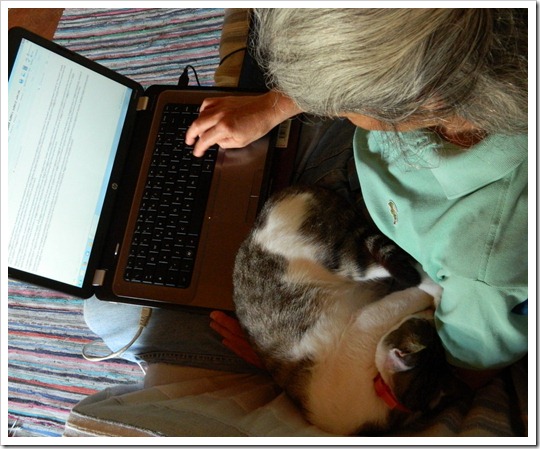Scrivere un blog con Jenny la gatta acciambellata sul mio braccio sinistro e con la sua coda che spazzola in continuazione la tastiera del portatile non è il modo migliore per lavorare. Sarebbe meglio scriverlo quando non ci sono gatti in giro. La cosa peggiore di tutte è cercare di fare le maiuscole con solo la mano destra. Peggio di così non potrebbe essere!
Writing a blog with Jenny the cat curled up on my left arm, and her tail continually brushing the keyboard of my laptop isn’t the best way to work. It would be better to write it when there aren’t any cats around. The worst thing is to do capital letters with only my right hand. It can’t get worse than that!
 |
|
Writing a blog with Jenny the cat curled up on my left arm … photo by Geoff Chamberlain©
|
This silly (but true) little introduction serves to illustrate the somewhat confusing topic of how to use migliore and meglio, peggiore and peggio. Let’s take a closer look with some practical examples:
1. Migliore (better, or the best) and peggiore (worse, or the worst) are both adjectives, meaning that they refer to nouns. More specifically they are the comparative and superlative forms of buono (good) and cattivo (bad):
le pizze di Bruno sono migliori di quelle di Giorgio (Bruno’s pizzas are better than Giorgio’s)
questa pizza è la migliore di Pontremoli (this is the best pizza in Pontremoli)
questo vino è peggiore di quello che abbiamo bevuto ieri (this wine is worse than the one we drunk yesterday)
questo è il peggior vino che abbia mai bevuto (this is the worst wine I’ve ever drunk)
N.B. in the plural migliore becomes migliori and peggiore becomes peggiori
2. Meglio (better) and peggio (worse) are adverbs, meaning that they refer to verbs. In particular they are the comparative forms of bene (well) and male (bad):
oggi mi sento meglio (today I’m feeling better)
quando fa caldo si sta peggio in città che in campagna (when it’s hot being in the city is worse than being in the countryside)
However, in modern Italian you will often hear meglio and peggio used in place of the more grammatically correct migliore and peggiore when they follow the verb essere (to be):
questi ravioli sono meglio di quelli, instead of questi ravioli sono migliori di quelli (these ravioli are better than those)
questo vino è peggio di quello, instead of questo vino è peggiore di quello (this wine is worse than that one).
Finally, meglio and peggio are used as nouns when they are preceded by the article il (the), meaning “the best” and “the worst”:
il meglio deve ancora venire = the best is yet to come
al peggio non c’è fine = just when you think things can’t get worse they usually do






Comments:
Cinzia:
Non dimenticare un’altra bell’espressione:
Ho fatto il mio meglio. = I did my best.
fare il proprio meglio = to do one’s best
Anna:
Sounds so simple when you put it like this, now if I could just remember it! “Easier said than done.” How do you say that? Grazie!
Geoff:
@Anna Salve Anna, we have a nice expression in Italian for “easier said than done” … “tra il dire e il fare c’è di mezzo il mare” = between the saying and the doing is the sea.
A presto, Geoff
Iris:
Grazie per la spiegazione
imparo l’italiano, e mi piace molte questo blog.
Ho una domanda;
‘questo è il peggior vino che abbia mai bevuto’
Perche usi ‘peggior’ e non ‘peggiore’ qua?
Serena:
@Iris Salve Iris, benvenuta e grazie per il commento.
Allora: ‘questo è il peggior vino che abbia mai bevuto’ Perché usi ‘peggior’ e non ‘peggiore’ qua?
In genere peggiore e migliore perdono la e finale quando precedono il nome a cui si riferiscono:
‘questo è il vino peggiore …’ oppure ‘questo è il peggior vino …’
Saluti da Serena
Iris:
Lo capisco, mille grazie!